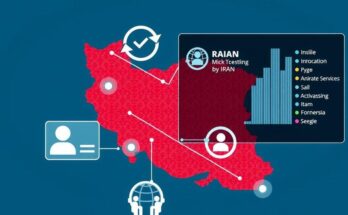The U.S. and Panama have signed an agreement enabling U.S. assistance in deporting migrants crossing the Darién Gap. Panamanian President Mulino stressed the need for international cooperation to combat criminal activities in the region. Colombian President Petro has called for a meeting with Panama and the U.S. to address the migration crisis, alongside plans to protect the Darién ecosystem. The spike in migrants through the region raises concerns over violence and exploitation.
On July 1, the United States and Panama formalized an agreement that permits U.S. officials to assist the Panamanian government in repatriating migrants traversing the Darién Gap on Panama’s southern border with Colombia. This treaty was signed shortly after the inauguration of Panamanian President José Raúl Mulino, who emphasized in his speech the need for international cooperation to address the challenges posed by criminal organizations exploiting this region for illegal activities, including drug trafficking and human smuggling. President Mulino asserted, “I will not allow Panama to be used as an open path for thousands of people who come to our country illegally, supported by international organizations related to drug dealing and human trafficking.” The U.S. Department of Homeland Security has pledged funding for initiatives aimed at mitigating irregular migration in the Darién, with a specific focus on deportation procedures, including necessary protection screenings. U.S. Secretary of Homeland Security Alejandro Mayorkas remarked, “Battling the smugglers is both a security and a humanitarian mission.” Shortly before the agreement’s announcement, Colombian President Gustavo Petro met with President Mulino to discuss collaborative strategies to tackle the regional migration crisis. They plan to convene a tripartite meeting involving Colombia, Panama, and the United States to formulate protective measures for both migrants and residents in the affected zone. In response to the ongoing migration pressures, President Petro has proposed a referendum among the indigenous and Afro-descendant populations in the Colombian Darién regarding the potential construction of an elevated transoceanic train that would minimize ecological disruption. This region, characterized by dense tropical fauna, sees thousands of immigrants navigating through its perilous terrain as they seek passage to the United States. The internal threats faced by migrants are exacerbated by the presence of the Clan del Golfo, a neo-paramilitary organization that exerts control over the Colombian side of the border. Furthermore, a report from Human Rights Watch highlighted grave shortcomings in the protection of migrants, indicating that both Colombia and Panama are failing to safeguard these vulnerable populations. The surge in migration through the Darién Gap is stark; from 130,000 migrants recorded in 2021, the numbers swelled to 250,000 in 2022 and rose to an unprecedented 520,000 in 2023. Despite these alarming figures, recent actions by the Panamanian government, including the suspension of Doctors Without Borders in the area and the installation of barbed wire to block entry, have attracted criticism. Experts in migration policy have expressed skepticism regarding President Mulino’s proposals; some assert that these measures may unintentionally empower criminal groups involved in human trafficking and increase the financial burdens on those attempting to cross the borders. Moreover, potential backlogs in migration processing could elevate violence against these populations within Colombia. Nevertheless, Colombia’s Ministry of Foreign Affairs remains focused on crafting effective plans to improve conditions in the Darién region and support migrants.
The Darién Gap, a treacherous stretch of land between Colombia and Panama, serves as a primary corridor for migrants attempting to reach the United States. The region is fraught with dangers, including harsh terrain, criminal gangs, and a lack of adequate infrastructure. Increased migration through the area has become a major concern for both Colombian and Panamanian governments, prompting international attention and intervention. The agreement between the U.S. and Panama aims to address these challenges through cooperative measures focused on enhancing border security and managing the humanitarian crisis created by the influx of migrants.
The agreement between the United States and Panama signifies a concerted effort to address the rising tide of irregular migration through the Darién Gap. Despite the intentions behind this agreement, experts caution that such strategies may not effectively counteract the underlying issues of human trafficking and the empowerment of criminal organizations. It remains essential for Colombian and Panamanian authorities to prioritize humanitarian measures that protect migrants while devising sustainable solutions to the regional migration crisis.
Original Source: www.latinamericareports.com




